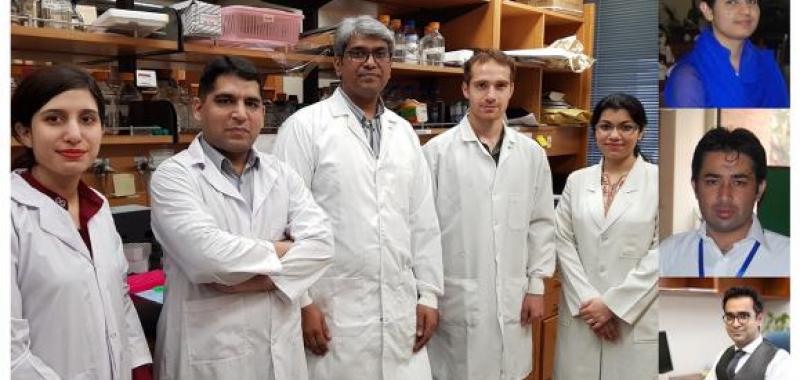
“Identification and characterization of SSE15206, a microtubule depolymerizing agent that overcomes multidrug resistance” has been accepted for publication in Nature Publishing Group’s Scientific Reports. This is collaborative research work between Dr. Rahman Shah Zaib Saleem, Department of Chemistry and Chemical Engineering’s laboratory and Dr. Amir Faisal's laboratory at the Department of Biology at Syed Babar Ali School of Science and Engineering (SBASSE) at the Lahore University of Management Sciences (LUMS).
The research work has spanned more than two and a half years and involved two MS students (Safia Manzoor and Sunniya Iftikhar), two lab instructors (Sardraz Khan and Aishah Bilal) and a PhD student (Rahim Ullah) who worked together under the supervision of Dr. Faisal and Dr. Saleem.”
Cancer is one of the leading causes of deaths worldwide, and there are more than 100,000 cancer-related deaths in Pakistan every year. Increased understanding of cancer biology during the last few decades has resulted in improved treatment options. Some of the current treatments, however, become ineffective due to development of multidrug resistance, where cancer cells stop responding to many types of drugs.
“We have been interested in discovering new compounds that could kill multidrug-resistant cancer cells. In this regard, we have identified and characterised a new molecule named SSE15206 that overcomes such multidrug resistance in different types of cancers. The ability of SSE15206 to overcome multidrug resistance makes this class of molecules promising precursors for the development of drugs that can overcome cancer multidrug resistance,” elaborated Dr. Faisal.
The compound, SSE15206 is a promising hit for developing a drug to overcome multidrug resistance in cancer. However, this is only the first step. “We need to carry out more work to optimise several of its properties including potency, efficacy, and pharmacokinetics need to be optimised to have a candidate drug. So immediately, this may not impact the common man, but in the long run, it will pave the way for the development of new drugs that can benefit people suffering from drug-resistant cancers,” added Dr. Faisal.
The labs plan to pursue this hit compound further to develop the lead compound for further studies. Additionally, they are planning lead optimisation studies to improve SSE15206 so it is closer to a drug like molecule and can be evaluated in xenograft mouse models for efficacy against tumours. The timeline for such studies is usually 3-4 years and depends on whether funding can be secured or not for further studies and in-house facilities for in vivo experiments.
Talking about the collaborative achievement, Dr. Faisal commented, “This study is a collaborative effort between my lab in Biology and Dr. Rahman Shah Zaib Saleem’s lab at the Department of Chemistry and Chemical Engineering and is a perfect example of SBASSE’s no boundaries vision. One of the most important aspects of the publication is that most of the work was done at LUMS by students and research staff from both labs. Our students and research staff work together on many different projects and this is the second publication that has come out of our collaborative effort. This publication is one of the rare examples of such studies coming out of Pakistan. Dr. Saleem and I are both confident that our labs can produce great quality research in drug discovery here at LUMS. We would like to thank LUMS for providing funding in the form of Faculty Initiative Fund to complete this research. We would also like to thank our respective departments for providing excellent facilities and support to carry out this research.”
Vice Chancellor LUMS, Prof. Dr. S. Sohail H. Naqvi congratulated the faculty and said, “Great to see faculty reaching for the stars at LUMS. They are pushing new boundaries, working on a problem that is internationally significant and locally relevant, collaborating with each other, working with graduate students, collaborating internationally and carrying out the great research work at LUMS.”


